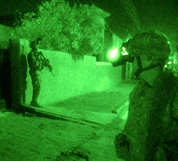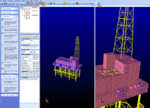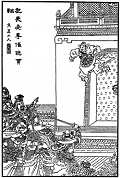 According to this article in the South Florida Sun-Sentinel, an Iranian woman and mother of two has voluntarily left Iran to face charges in South Florida that she attempted to export illegal 3,000 helmet-mounted night vision systems from the United States to the Iranian military. This is a somewhat surprising decision given that the United States and Iran understandably don’t have extradition treaties with each other.
According to this article in the South Florida Sun-Sentinel, an Iranian woman and mother of two has voluntarily left Iran to face charges in South Florida that she attempted to export illegal 3,000 helmet-mounted night vision systems from the United States to the Iranian military. This is a somewhat surprising decision given that the United States and Iran understandably don’t have extradition treaties with each other.
The woman, Shahrazad Mir Gholikhan, was arrested in Vienna, Austria in 2004 when she and her ex-husband, Mahmoud Seif, traveled to Vienna Austria to pick up one night vision system that had been exported from the United States to Austria and that they planned to re-export to the Iranian military. She was convicted of violating Austrian export laws and sentenced to 50 days in prison. A grand jury in Florida thereafter indicted her on charges of money laundering and export violations.
At a bond hearing in Fort Lauderdale last Friday, Gholikan’s attorney David Markus explained Gholikhan’s remarkable decision on the basis that “she believes in her innocence.” But the defenses so far proffered by her attorney aren’t very convincing on their face:
Markus claims prosecutors have Gholikhan confused with another woman and his client at most acted as a translator. He is pushing to have the case thrown out, arguing Gholikhan’s 2005 conviction on similar charges in Austria makes the U.S. prosecution a violation of double jeopardy protections.
Saying that it wasn’t her but if it was she was only a translator is rather like arguing that your client wasn’t involved in the bank robbery but if he was he only drove the get-away car.
And the double jeopardy claim is equally fanciful. The Supreme Court stated in United States v. Wheeler, 435 U.S. 313 (1978) that prosecutions
brought by separate sovereigns, they are not “for the same offence,” and the Double Jeopardy Clause thus does not bar one when the other has occurred.
So, it won’t be long before Ms. Gholikan may be tapping her heels together and chanting “There’s no place like home.” That may have gotten Dorothy back to Kansas but it’s doubtful whether it will get Ms. Gholikhan back to her home in Tehran.

 Posted by
Posted by  Category:
Category: 

 A copy of the indictment of two Louisiana men for selling CAD software to companies in Iran which we
A copy of the indictment of two Louisiana men for selling CAD software to companies in Iran which we  According to an Associated Press
According to an Associated Press  U.S. District Court Judge Inge P. Johnson, after a seven day bench trial, recently
U.S. District Court Judge Inge P. Johnson, after a seven day bench trial, recently  I now have a copy of the criminal complaint filed against Qing Li and it answers a number of questions left open by
I now have a copy of the criminal complaint filed against Qing Li and it answers a number of questions left open by 

